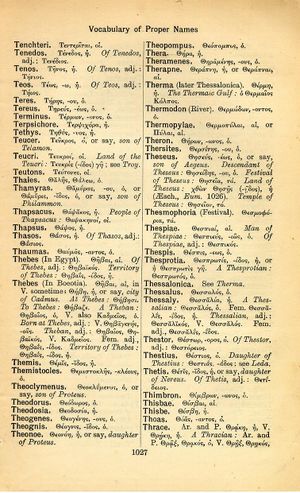Thamyras
οἵτινες πόλιν μίαν λαβόντες εὐρυπρωκτότεροι πολύ τῆς πόλεος ἀπεχώρησαν ἧς εἷλον τότε → after taking a single city they returned home, with arses much wider than the city they captured
English > Greek (Woodhouse)
Θαμύρας, -ου, ὁ, or Θάμυρις, -ιδος, ὁ, or say, son of Philammon.
Latin > English (Lewis & Short)
Thămyras: ae, m.,
I a Thracian poet who entered into a contest with the Muses, and, being vanquished, was deprived of his eyes, Prop. 2, 22 (3, 15), 19; Ov. Am. 3, 7, 62; id. A. A. 3, 399; id. Ib. 274; Plin. 7, 56, 57, § 204.—Called Thămyris, ĭdis, Stat. Th. 4, 183.
Latin > French (Gaffiot 2016)
Thămўrās, æ, m., (Thămўris, is, m., Stat. Th. 4, 183 ), poète de Trace qui, ayant fait assaut de chants avec les Muses, fut battu, puis privé de la voix et de la vue : Prop. 2, 22, 19 ; Ov. Am. 3, 7, 62 ; Plin. 7, 204.
Latin > German (Georges)
Thamyrās, ae, m. u. Thamyris, idis, m. (Θάμυρις), ein thrazischer Dichter, der mit den Musen einen Wettstreit einging und besiegt seiner Laute und Augen beraubt wurde, Form -ās, Prop. 2, 22, 19. Ov. am. 3, 7, 62 (Akk. -ān); art. am. 3, 399 (Akk. -am): griech. Form -is, Stat. Theb. 4, 183.

